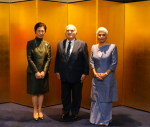You are here
America's losing China strategy
Sep 27,2021 - Last updated at Sep 27,2021
WASHINGTON, DC — Despite the cantankerous, polarised atmosphere in Washington, DC, there seems to be bipartisan agreement on one thing at least: That China is a problem, and that the United States must respond to the competitive challenge it poses. With military and economic strength as its main components, the Sino-American rivalry has come to be seen as a contest to determine who will lead the regional and global order.
Economic dynamism is a necessary condition for establishing military strength. For the US to maintain and strengthen its leadership role in the world economy, it must have both allies and a vibrant domestic economy. Why, then, is US President Joe Biden’s administration sponsoring policies that will help China reduce America’s own economic advantage?
Instead of asking how the US can improve its economic performance, the administration is imitating China by letting the government pick winners and losers among technologies and industries. In doing so, it is abandoning traditional US support for the open multilateral trading system, the rule of law, and private enterprise within an appropriate governance framework.
In any competition, there are always two basic strategies from which to choose. The more resources and attention that are directed toward one option, the less will be available for the other. The first strategy is offensive and consists of strengthening one’s own capabilities; the second is defensive and consists of trying to weaken the competitor.
With respect to China, the US has already tried a defensive strategy without success. This was the approach taken by former President Donald Trump, who launched a “trade war” by imposing tariffs and sanctions on China. Despite those actions, China averaged over 6 per cent annual GDP growth in 2017-19, dwarfing the US economy’s 2.5 per cent average annual growth during that period. In 2020, the year of the COVID-19 shock, the Chinese economy grew 2.3 per cent, while US GDP fell by more than 3.5 per cent. In the International Monetary Fund’s most recent forecast for 2021, China is expected to grow by 8.1 per cent, compared to around 7 per cent for the US.
Though Trump’s protectionist strategy clearly failed, the Biden administration is nonetheless perpetuating it by leaving the previous administration’s tariffs in place and adopting “buy American” policies of its own. By acting unilaterally, Trump weakened the open multilateral system and harmed the US economy, along with those of its allies. Yet even if the US under Biden secures the backing of most of its allies, it is not large or strong enough to do more than slow China’s rise moderately.
Since the end of World War II, no country has erected high protectionist walls and achieved satisfactory economic growth over any significant length of time. For decades, the US led much of the world down a better path. But instead of adopting an offensive strategy based on strengthening this role and leading by example, the US is now pursuing the kind of policies that have long failed in many other countries.
In practice, “picking winners” has more often led to supporting losers. Succumbing to political pressure and providing subsidies for otherwise failing businesses merely perpetuates economic inefficiencies. There is no reason why bureaucrats should be entrusted with identifying which innovations will prove successful in the future. Competition among start-ups and incumbent private businesses is a far more effective mechanism.
Protectionism and subsidies also encourage domestic monopolistic behaviour, leading to lower productivity growth and even more lobbying to maintain undue privileges. These practices discourage new players from entering markets and make it much more difficult for small firms to expand.
Likewise, US actions in the trade sphere are both curtailing America’s economic development and undermining its alliances, thereby diminishing its own global power. Consider, for example, the Biden administration’s decision not to reverse Trump’s withdrawal from the Trans-Pacific Partnership (TPP). Comprising 11 other Pacific-rim countries and notably excluding China, the TPP was poised to become the world’s largest free-trade bloc.
Given that US membership in such an arrangement would obviously increase its global influence, many expected Biden to negotiate America’s accession to the TPP’s successor, the Comprehensive and Progressive Agreement for Trans-Pacific Partnership (CPTPP), which was spearheaded by former Japanese Prime Minister Shinzo Abe after Trump abandoned the original deal. But the Biden administration has since signaled that it does not plan to pursue CPTPP membership.
China, meanwhile, is capitalising on US strategic errors by making its own bid for CPTPP membership (as the United Kingdom has also done). Thus, far from preserving or enhancing America’s hegemonic status, the Biden administration’s approach has increased China’s influence in the Asia-Pacific, the world’s most economically dynamic region.
For the better part of a century, the US was the world’s most productive economy because it remained committed to a market-oriented system, the rule of law, and open trade. Where it led, Western Europe, East and Southeast Asia, and others followed. In this way, policies and principles that strengthened its allies also strengthened its own hegemonic position.
Now, China is rising, largely because it abandoned its earlier economic policies in favor of a more market-oriented system. That makes the US decision to abandon its own system in favor of Chinese-style state interventions perversely ironic. In adopting Chinese-style policies, the US is not only reducing its competitive edge; it is effectively disavowing the liberal market-oriented open system and its own global leadership role.
Removing protectionist measures and strengthening the open multilateral system would yield vastly superior results relative to the Trumpian approach. The US should reengage as a constructive leader within the World Trade Organisation and seek agreements on reforms to cover new issues like e-commerce and climate change. The more that China tries to expand state-sponsored industries, the more the US should do to show that there is a better alternative.
Anne O. Krueger, a former World Bank chief economist and former first deputy managing director of the International Monetary Fund, is senior research professor of International Economics at the Johns Hopkins University School of Advanced International Studies and senior fellow at the Centre for International Development at Stanford University. Copyright: Project Syndicate, 2021. www.project-syndicate.org













